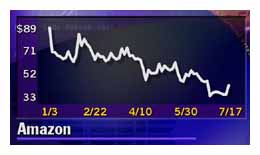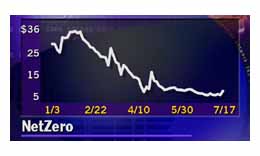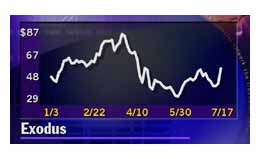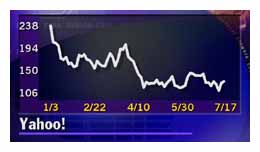|
Dot.com future in doubt
|
 |
July 17, 2000: 11:28 a.m. ET
Shakeout in Internet universe continues; investors demand profits
By Staff Writer Michele Masterson
|
NEW YORK (CNNfn) - Don't pop the champagne just yet. Sure, Yahoo!'s quarterly report card wowed Wall Street last week, but that doesn't mean the Internet sector is back on track.
In fact, many analysts believe there are a lot more dot.com disasters waiting in the wings than dot.com darlings.
"What's happening right now is that as the industry matures, we're testing business models," said PaineWebber analyst Chris Dixon. "For those companies that have business models where you are driven by a diverse source of revenue stream and where revenues are higher than expenses, you are going to do fine."
"Those companies that don't have really well thought out business models and are driven by a need to spend money to capture customers and maybe make it some time in the future are toast," Dixon said.
Even mighty Amazon is a question mark
One Web player that has drawn investor ire is Internet retailer Amazon (AMZN: Research, Estimates). The company is under fire for heavy spending and has yet to turn a profit. Investors, once eager to jump in the Internet investing melee, are now impatient with the company's quarter-after-quarter losses, without a speck of black ink on its balance sheets.
 Coupled with a lack of returns, is the belief that advertising spending online has slowed and will continue to sputter. Since many dot.coms make their money by charging for ads, investors aren't seeing much of a future and many analysts believe that dot.coms need to show diversification among revenue generators, rather than rely solely on ad spending. Coupled with a lack of returns, is the belief that advertising spending online has slowed and will continue to sputter. Since many dot.coms make their money by charging for ads, investors aren't seeing much of a future and many analysts believe that dot.coms need to show diversification among revenue generators, rather than rely solely on ad spending.
Another shakeout factor points to companies that, as one analyst says, are lower down on the Internet food chain. These startups sprouted like crazy, trying to cash in on the Internet mania but are heavily reliant on Wall Street to line their pockets and are burning their cash reserves at an alarming rate.
As an example, one Wall Street watcher cited NetZero (NZRO: Research, Estimates), which offers "free Internet access forever." The Westlake Village, Calif.-based company was launched in October 1998, and claims four million registered users around the globe. NetZero went public in September 1999, and for that year reported revenue of $903,000 and a net loss of $7.1 million.
NetZero subscribers gain free Web access by providing the company with demographic and personal interest information, which NetZero sells as "profiles" to advertisers, which then target the kind of customers they're looking to woo.
"NetZero is 100 percent e-commerce supported," the analyst said. "Some of its business comes from lower-quality clients and as they continue to subsidize and give away costly Internet access, they are burning through their cash reserves at an aggressive pace."
 "What you'll see in their second quarter is that the seasonality of the business caused their growth to stagnate. So, if your growth is stagnating and you're still investing and burning through cash, it makes for a difficult scenario for investors." "What you'll see in their second quarter is that the seasonality of the business caused their growth to stagnate. So, if your growth is stagnating and you're still investing and burning through cash, it makes for a difficult scenario for investors."
Currently, NetZero trades around 7 a share, a far cry from its 52-week high of 40.
Frederick Moran, an Internet analyst at Jefferies & Co. said investors are more cautious today when it comes to Internet stocks.
"I think we're in the early throes of distinguishing the winners and the losers in the dot.com space," said Moran. "Too many dot.coms came public too quickly and were given money without real scrutiny of whether or not their strategies made financial sense."
"Now Wall Street has turned more cautious. They're demanding more evidence of a trend towards profitability and those companies that have a lot more questionable business models will be shunned by Wall Street," Moran said.
So, who do you like?
Keeping in mind that the fittest Web companies that will survive are those with a solid plan and which derive revenue from a variety of sources, analysts such as Moran point to examples such as America Online (AOL: Research, Estimates), Yahoo! and Exodus Communications (EXDS: Research, Estimates).
"Exodus is the leader in high-end Web hosting and although a good number of their clients are dot.com companies, they're not completely reliant on dot.com companies," said Moran.
"Corporate America in general needs to establish Web sites in order to enhance their business prospects and the giant, successful dot.com companies like Yahoo! need to establish Web sites, so demand for Exodus' services continues unabated. It represents one of the fastest-growing companies on the Internet, in one of the most exciting markets and that's providing Internet infrastructure."
 "The company is seeing over 100 percent year-over-year growth right now and has already trended into positive cash flow profitability. We rate them a 'buy' with a price target of $100 a share," Moran said. "The company is seeing over 100 percent year-over-year growth right now and has already trended into positive cash flow profitability. We rate them a 'buy' with a price target of $100 a share," Moran said.
Exodus currently trades around 51 and has a 52-week high of 89-13/16, with a low of 12-21/64.
PaineWebber's Dixon said he focuses on Internet companies that are based upon media businesses and said he is comfortable with companies such as Yahoo!, AOL, and 24/7 (TFSM: Research, Estimates).
New York-based 24/7 runs a network of Web sites that combine Internet advertising, direct-marketing campaigns and commerce. The company currently trades around 15, just above its 52-week low of 12-1/16, and way off its high of 65-1/4. Still, Dixon remains bullish in his outlook.
"These companies can tap into the need for marketers to use the Internet as an appropriate marketing tool," said Dixon. "I look at 24/7, which really recognizes the need to move away from just providing advertising banners.
"24/7 is doing everything from opt-in e-mail to providing connectivity to creating a diversified way to provide a marketing solutions for companies who are looking to use the Internet to help drive and attract customers, Dixon said. "It's a viable business model."
Digitial Darwinism
Tim Koogle, Yahoo!'s (YHOO: Research, Estimates) chairman and chief executive officer, readily acknowledges the Web sifting and in his mind, it's necessary but believes investors shouldn't sound the death knell just yet.
"There's a lot of press out there that wants to talk about the negative future of the Internet," Koogle told CNNfn the day after Yahoo!'s earnings came out. "We're in a period of industry consolidation that we've actually been in for probably, from our perspective, at least three quarters now. It's a natural thing and I think it's really healthy, frankly."
 Koogle may think it's healthy because he commands a view from the top of the heap and his company's lauded business plan helped put Yahoo! in the catbird seat. Koogle may think it's healthy because he commands a view from the top of the heap and his company's lauded business plan helped put Yahoo! in the catbird seat.
Influential Morgan Stanley analyst Mary Meeker called Yahoo!'s recent earnings "outstanding," and said "Yahoo!'s financial model shows great flexibility. The company has one of the best financial models we have ever seen and we consider it to be one of the world's most powerful brands."
Koogle believes in the future of dot.com companies, if like his company, they have all the pieces solidly in place. Investors just have to look a little bit harder for them.
"The fundamentals of the Internet are still there," said Koogle. 
--Click here to send e-mail to Michele Masterson
|
|
|
|
|
|
Yahoo!
|
Note: Pages will open in a new browser window
External sites are not endorsed by CNNmoney
|
|
|
|
 |

|

